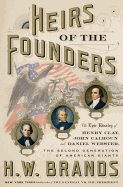
While the first generation of Founding Fathers are well represented in American history, the leaders who immediately followed them often receive less attention. In Heirs of the Founders, Pulitzer Prize finalist H.W. Brands (Traitor to His Class) elevates several pivotal members of that second generation: Henry Clay ("the Great Compromiser"), John Calhoun and Daniel Webster.
Brands focuses on the interplay among these three titans during the period between the War of 1812 and the Compromise of 1850. The men rarely agreed completely, but oftentimes two would find alignment, even as the political philosophies and causes they supported changed over time. For example, Calhoun has a reputation for his staunch support of secessionism, while Clay and Webster aligned with the Union cause. However, early on, Calhoun and Clay championed the nation against Webster's Federalist party, and its machinations toward secession during the War of 1812. Not until the secession crisis of the early 1830s did the more familiar Clay/Webster vs. Calhoun paradigm emerge, when a rearrangement of presidential aspirations came into play.
To provide this more defined picture of Clay, Calhoun and Webster, Brands draws primarily from their Senate and House speeches, and includes some addresses in their entirety. Reporting of Congressional speeches was haphazard at the time, making Brands's research and presentation in Heirs of the Founders especially insightful for both the casual reader and professional historian. --William H. Firman Jr., presidential historian and writer

